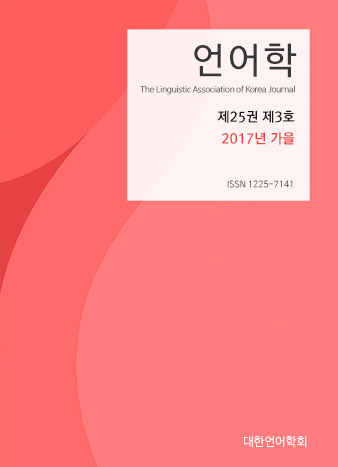대한언어학회 전자저널

25권 3호 (2017년 9월)
- NS and NNS apology strategies in English
-
Kyongseon Jeon
Pages :
Abstract
Jeon, Kyongseon. (2017). NS and NNS apology strategies in English. The Linguistic Association of Korea Journal, 25(3), 1-23. The current study explores how native (NS) and non-native speakers (NNS) of English use different apology strategies in different contexts. Twenty NSs and 20 NNSs completed a written Discourse Completion Task (DCT). The analyses of data focused on various apology strategies such as the use of explicit expression of apology, explanation of situation, acknowledgment of responsibility, offer of repair, and promise of forbearance. The analysis also looked at modifications on apologies using downgraders and intensifiers. The results indicated both NS and NNS respondents used very similar apology strategies although NNSs relied slightly more on explicit expressions of apology than NSs. Both groups chose different strategies depending on the situation presented on the written DCT, indicating sensitivity to social factors such as social distance and power, and severity of offense. The current study suggests directions for future research focusing on sociocultural factors and L2 proficiency which might determine the production of L2 pragmatic conventions by NS and NNS respondents.
Keywords
# English apology strategies # social factors and apology strategies
References
- Al-Zumor, A. W. Q. G. (2011). Apologies in Arbic and English: An inter-language and cross-cultural study. Journal of King Saud University-Languages and Translation, 23(1), 19-28.
- Bardovi‐Harlig, K. (1999). Exploring the interlanguage of interlanguage pragmatics: A research agenda for acquisitional pragmatics. Language Learning, 49(4), 677-713.
- Bardovi-Harlig, K., & Bastos, M. T. (2011). Proficiency, length of stay, and intensity of interaction and the acquisition of conventional expressions in L2 pragmatics. Intercultural Pragmatics, 8(3), 347-384.
- Bardovi-Harlig, K., & Mahan-Taylor, R. (2003). Teaching Pragmatics. Washington, DC: United States Department of State.
- Bataineh, R. F., & Bateineh, R. F. (2008). A cross-cultural comparison of apologies by native speakers of American English and Jordanian Arabic. Journal of Pragmatics, 40, 792-821.
- Bergman, M. L., & Kasper, G. (1993). Perception and performance in native and nonnative apology. Interlanguage pragmatics, 4(1), 82-107.
- Blum-Kulka, S., House, J., & Kasper, G. (1989). Cross-cultural pragmatics: Requests and apologies (Vol. 31). Ablex Pub.
- Blum-Kulka, S., & Olshtain, E. (1984). Requests and apologies: A cross-cultural study of speech act realization patterns (CCSARP). Applied Linguistics, 5, 196-213.
- Brown, P., & Levinson, S. (1987). Universals in language usage: Politeness phenomena. In E. N. Goody (Ed.), Questions and politeness (pp. 56-310). Cambridge, England: Cambridge University Press.
- Chang, Y.-F. (2011). Refusing in a foreign language: An investigation of problems encountered by chinese learners of English. Multilingua, 30, 71-98.
- Chen, X. (2011). Politeness Theory and Foreign Language Studies. Beijing: Foreign Language. Teaching and Research Press.
- Cohen, A. D., & Shively, R. L. (2007). Acquisition of requests and apologies in Spanish and French: Impact of study abroad and strategy‐building intervention. The Modern Language Journal, 91(2), 189-212.
- Cohen, A. D., & Olshtain, E. (1981). Developing a measure of sociocultural competence: The Case of apology. Language Learning, 31, 113-134.
- Edmondson, W., & House, J. (1991). Do learners talk too much? The waffle phenomenon in interlanguage pragmatics. Foreign/Second Language Pedagogy Research, 273-286.
- Goffman, E. (1971). Relations in public: Microstudies of the public order. Harmondsworth, England: Penguin.
- Hatfield, H., & Hahn, J-W. (2011). What Korean apologies require of polite theory. Journal of Pragmatics, 43, 1303-1317.
- Kasper, G. (1997). Can pragmatic competence be taught. NetWork, 6, 105-119.
- Kasper, G. (2001). Four perspectives on L2 pragmatic development. Applied linguistics, 22(4), 502-530.
- Kasper, G., & Rose, K. R. (Eds.). (2001). Pragmatics in language teaching. Ernst Klett Sprachen.
- Lukasik, V. J. (2000). Predictors of the willingness to use forgiveness as a coping strategy in adolescent friendships. Unpublished Ph.D. Dissertation. Wayne State University, Detroit, MI, USA.
- Olshtain, E., & Cohen, A. D. (1983). Apology: A speech act set. In N. Wolfson and E. Judd (Eds.) Sociolinguistics and Language Acquisition. Rowley, MA: Newbury House, 18-35.
- Rintell, E., & Mitchell, C. J. (1989). Studying requests and apologies: An inquiry into method. Cross-cultural pragmatics: Requests and apologies, 248-272.
- Shariati, M., & Chamani, F. (2010). Apology strategies in Persian. Journal of Pragmatics, 42(6), 1689-1699.
- Sugimoto, N. (1990), A Japan-US comparison of apology styles. Communication Research, 24(4), 349-269.
- Thomas, J. (1983). Cross-cultural pragmatic failure. Applied Linguistics, 4(2), 91-112.
- Trosborg, A. (1987). Apology strategies in natives /non-natives. Journal of Pragmatics,11, 147-167.
- Ugla, R. L., & Abidin, M. J. Z. (2016). A Study of Apology Strategies Used by Iraqi EFL University Students. International Journal of Evaluation and Research in Education, 5(1), 32-38.
- Usó-Juan, E., & Martínez-Flor, A. (2014). Reorienting the assessment of the conventional expressions of complaining and apologizing: From single-response to interactive DCTs. Iranian Journal of Language Testing, 4(1), 113-136.
- Vollmer, H. J., & Olshtain, E. (1989). The language of apologies in German. Cross Cultural pragmatics: Requests and apologies, 197-218.
- Wu, J., & Wang, W. (2016). “Apology Accepted”: A Cross-Cultural Study of Responses to Apologies by Native Speakers of English and Chinese. International Journal of English Linguistics, 6(2), 63.